HVAC Companies Lancing
Best HVAC Contractor in Lancing
Get 3 FREE HVAC Services quotes for your project today! Compare profiles, reviews, accreditations, portfolio, etc... and choose the best deal.
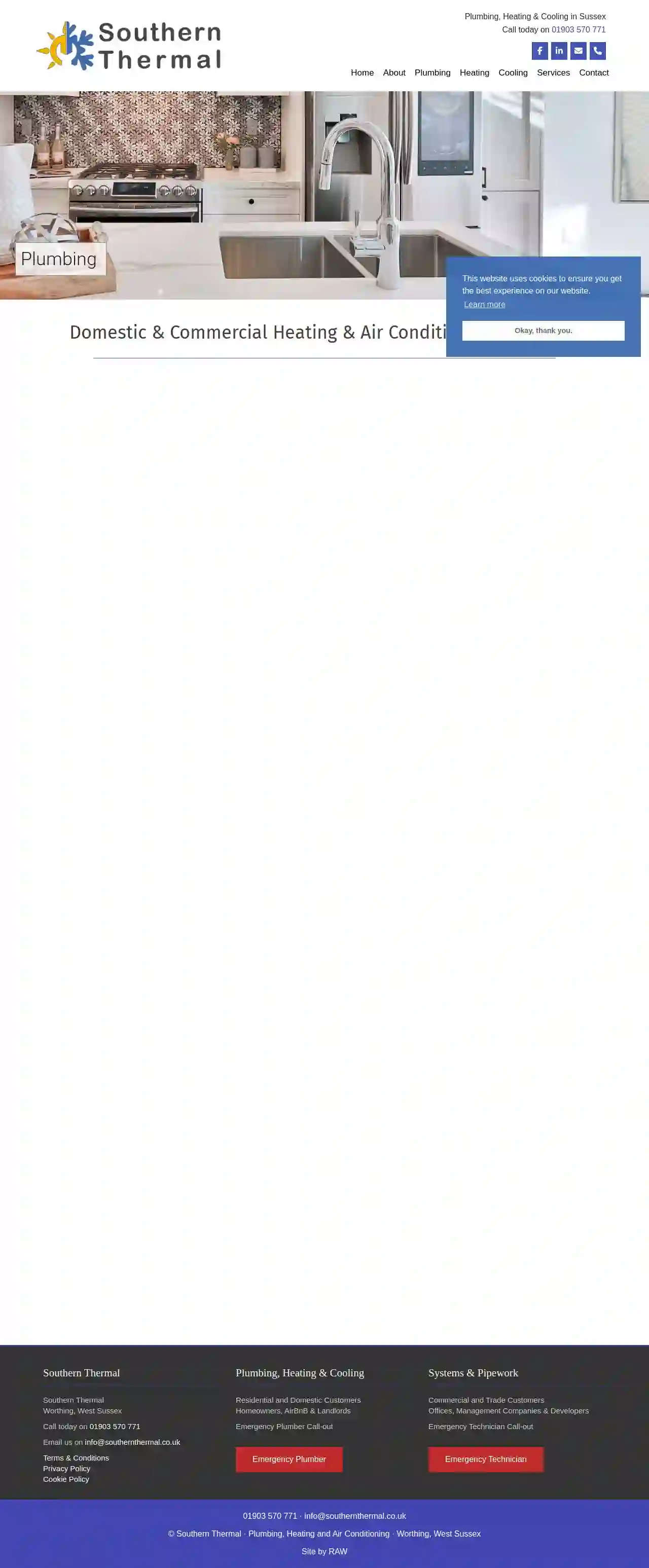
Southern Thermal
4.624 reviewsWorthing, West Sussex, BN11 1XX, GBSouthern Thermal are based in Worthing, West Sussex and specialise in Plumbing, Heating, Air Conditioning and Renewables for both Domestic and Commercial customers. Our qualified plumbing, heating, air conditioning and renewables engineers are able to help with general plumbing, boiler installation, servicing and replacement, heating, ventilation, air conditioning and refrigeration. Our engineers are also gas safe registered and F-Gas registered. Qualified for all domestic and commercial work. We can design, install, service and repair all leading manufacturer's plumbing, heating, renewable and air conditioning systems which allows us to offer a complete and comprehensive service to our customers. Our qualified engineers are happy to help with any issues you have at your domestic or commercial premises, regardless of how big or small the job is. Southern Thermal are working with our customers and suppliers to reduce carbon omissions, lower energy bills and be environmentally friendly. We cover the South East of England including; East Sussex, West Sussex, Surrey, Hampshire, Kent and London.
- Services
- Why Us?
- Gallery
Get Quote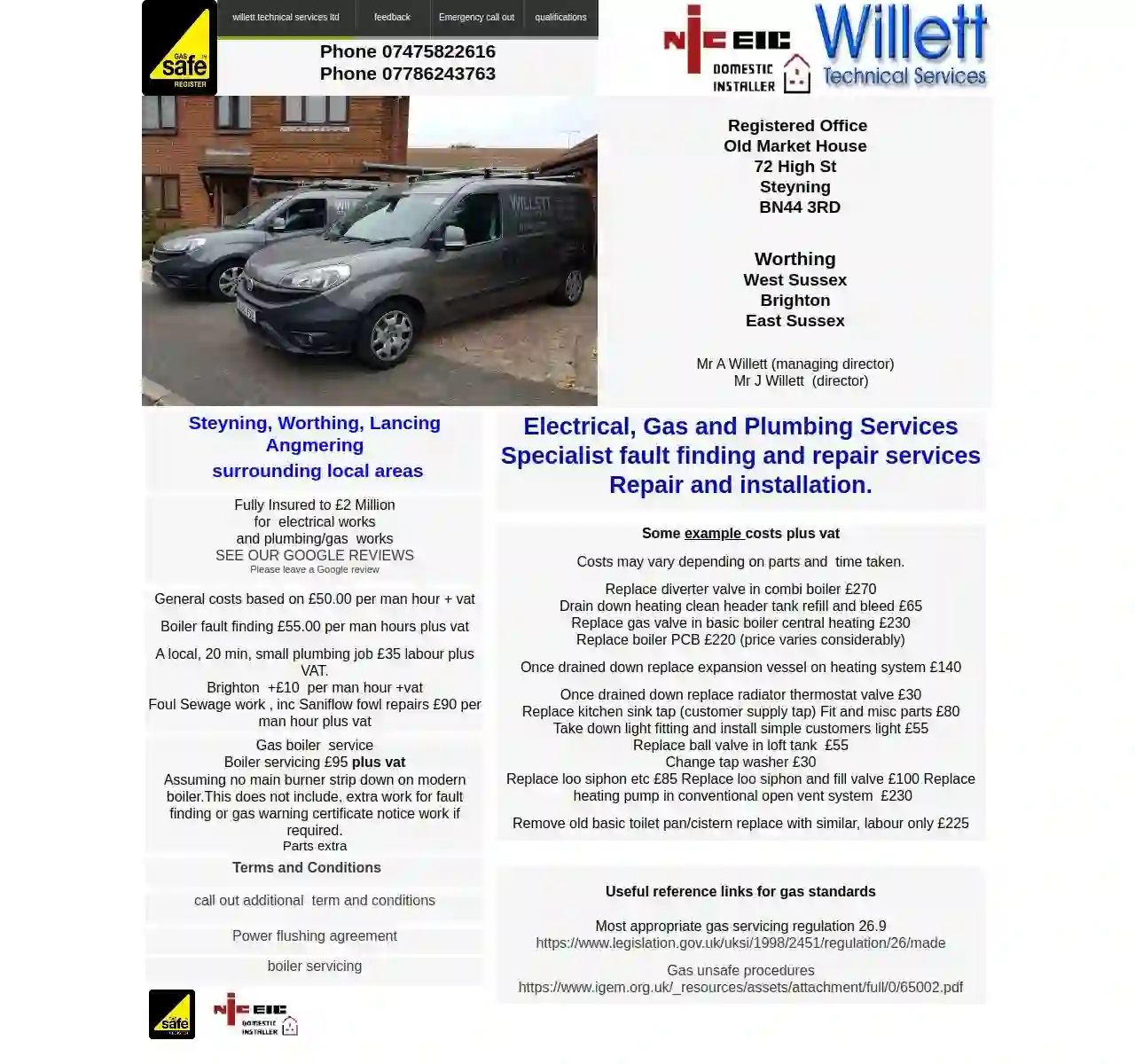
Willett Technical Services Ltd
527 reviews72 High St, Steyning, Old Market House, BN44 3RD, GBMr A Willett (managing director) Mr J Willett (director) Registered OfficeOld Market House72 High StSteyning BN44 3RD WorthingWest SussexBrightonEast Sussex willett technical services ltd feedback Emergency call out qualifications Phone 07475822616Phone 07786243763 Electrical, Gas and Plumbing ServicesSpecialist fault finding and repair servicesRepair and installation. Steyning, Worthing, LancingAngmering surrounding local areas Fully Insured to £2 Millionfor electrical worksand plumbing/gas worksSEE OUR GOOGLE REVIEWSPlease leave a Google review https://g.page/r/CdJnh4_qn_pAEB0/review General costs based on £50.00 per man hour + vat Boiler fault finding £55.00 per man hours plus vat A local, 20 min, small plumbing job £35 labour plus VAT.Brighton +£10 per man hour +vat Foul Sewage work , inc Saniflow fowl repairs £90 per man hour plus vat Gas boiler service Boiler servicing £95 plus vat Assuming no main burner strip down on modern boiler.This does not include, extra work for fault finding or gas warning certificate notice work if required.Parts extra Some example costs plus vat Costs may vary depending on parts and time taken. Replace diverter valve in combi boiler £270Drain down heating clean header tank refill and bleed £65 Replace gas valve in basic boiler central heating £230Replace boiler PCB £220 (price varies considerably) Once drained down replace expansion vessel on heating system £140 Once drained down replace radiator thermostat valve £30Replace kitchen sink tap (customer supply tap) Fit and misc parts £80 Take down light fitting and install simple customers light £55 Replace ball valve in loft tank £55 Change tap washer £30Replace loo siphon etc £85 Replace loo siphon and fill valve £100 Replace heating pump in conventional open vent system £230 Remove old basic toilet pan/cistern replace with similar, labour only £225
- Services
- Why Us?
- Our Team
- Gallery
Get Quote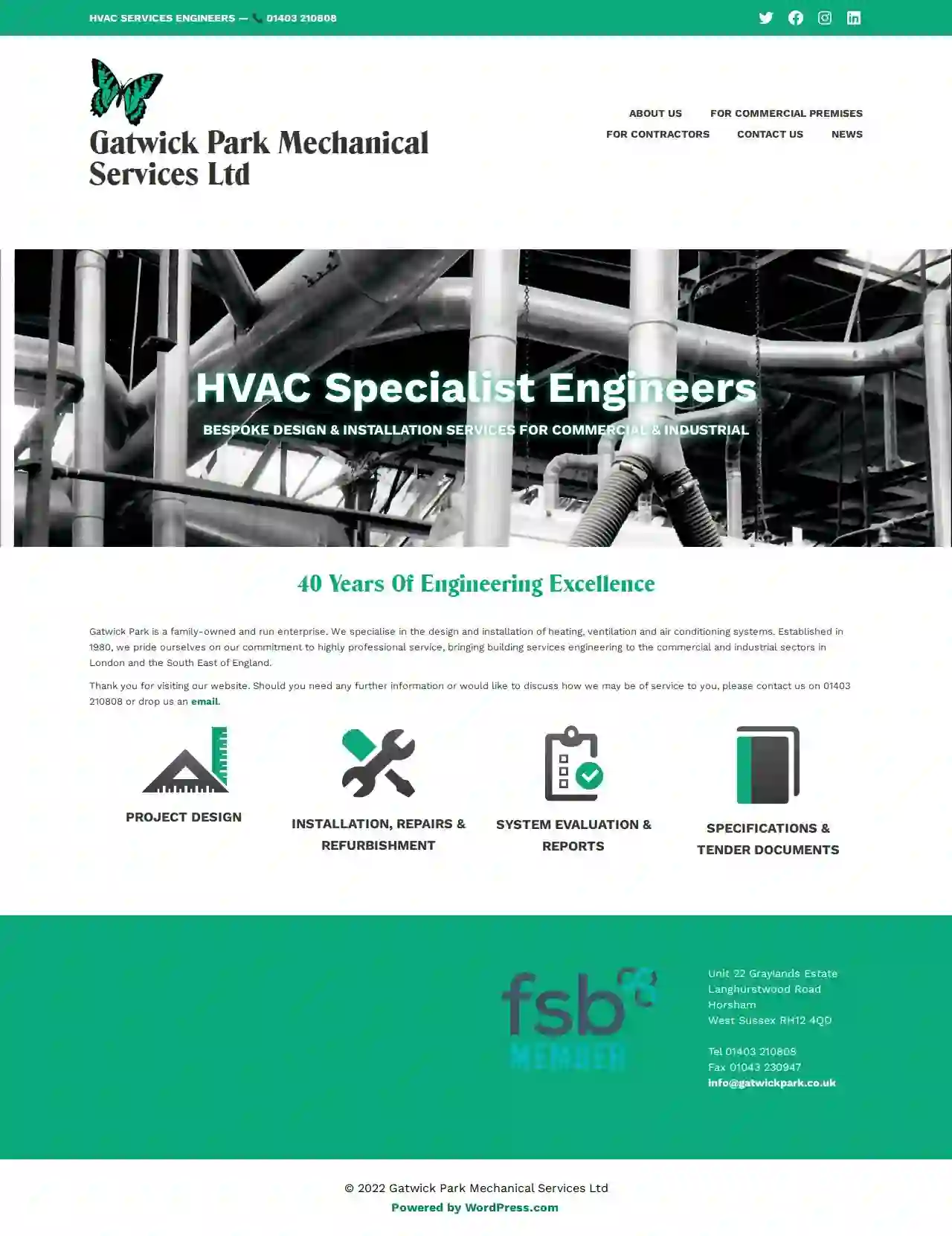
Gatwick Park Mechanical Services Limited
Langhurstwood Road, Unit 22 Graylands Estate, Horsham, RH12 4QD, GBGatwick Park Mechanical Services Ltd was established in June 1980. The company has always been a family-run and owned concern, initially having been set-up by mechanical engineer, Colin Coote and his wife, Audrey. It is now run by their son and daughter, Martin and Jenny. The company has a long history of providing bespoke design and installation services for commercial and industrial clients in London and the South East of England. With over 40 years of engineering excellence, Gatwick Park Mechanical Services Ltd prides itself on its commitment to highly professional service, bringing building services engineering to the commercial and industrial sectors. The company has a wide range of experience in designing and installing heating, ventilation and air conditioning systems for various sectors, including public, private and commercial sectors. The company's portfolio includes recent projects such as airport hotels, commercial buildings, schools, and public sector locations.
- Services
- Why Us?
- Our Team
- Gallery
Get Quote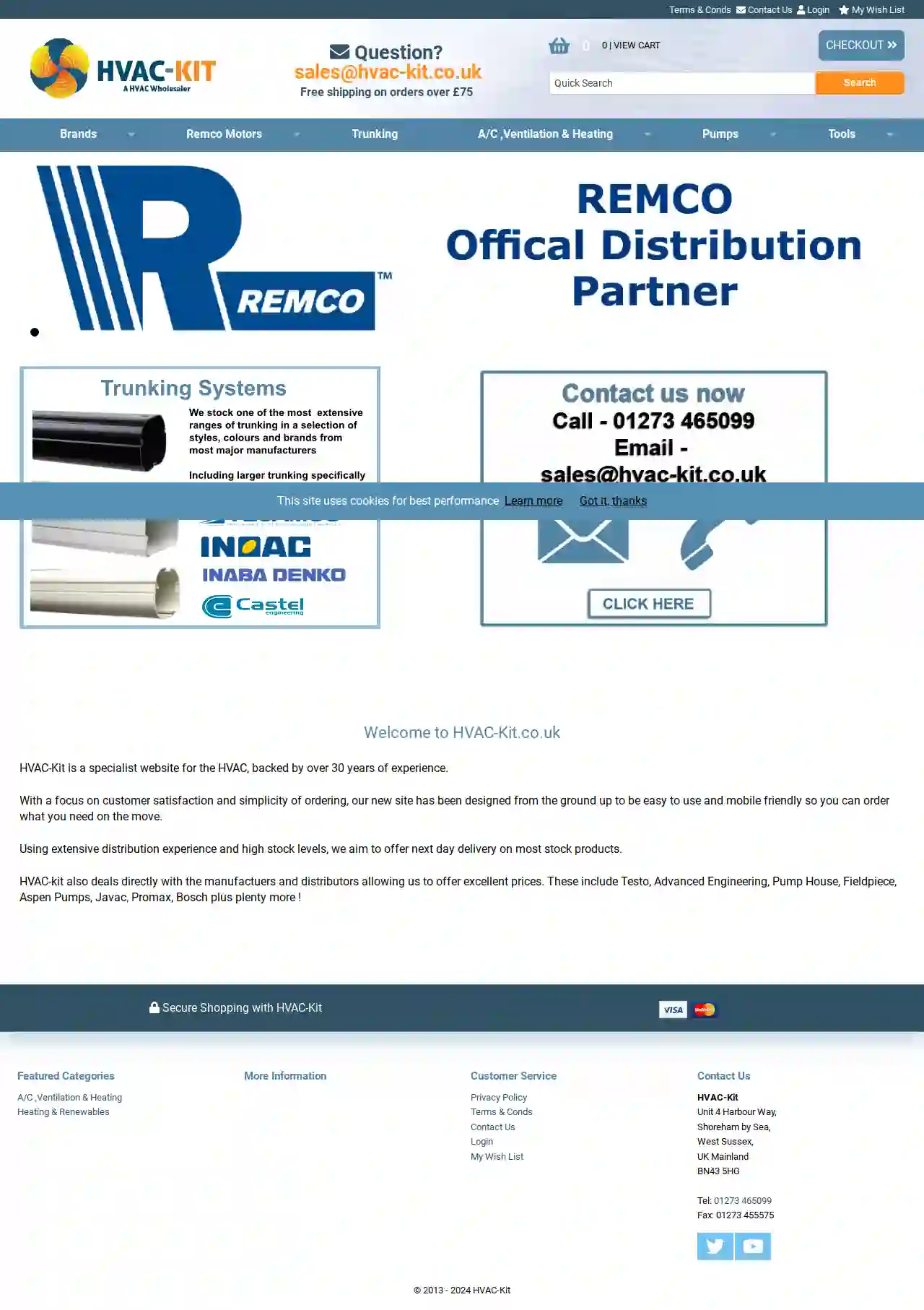
hvac-kit.co.uk
Unit 4 Harbour Way, Shoreham by Sea, BN43 5HG, GBHVAC-Kit is a specialist website for the HVAC industry, backed by over 30 years of experience. We're dedicated to customer satisfaction and making ordering simple. Our new site is designed for ease of use and mobile friendliness, so you can order what you need on the go. With extensive distribution experience and high stock levels, we aim to offer next day delivery on most products. We work directly with manufacturers and distributors, allowing us to provide excellent prices. Our range includes top brands like Testo, Advanced Engineering, Pump House, Fieldpiece, Aspen Pumps, Javac, Promax, Bosch, and many more!
- Services
- Why Us?
- Gallery
Get Quote
Insulation Sussex
4.73 reviewsUnit 1, 10-12 North Road, Brighton, 10-12 North Road, BN1 1UT, GBInsulation Sussex is a leading insulation installing company based in Brighton, Sussex. They have helped thousands of homeowners with their expert home insulation services and are a premier choice for insulation services throughout Sussex. Their list of prominent services includes cavity wall insulation, loft insulation, internal and external wall insulation, roof insulation, spray foam insulation, and insulation removal/extraction services. As local experts in home insulation, they know the importance of high-quality insulation materials and offer them at affordable prices. They have a long list of satisfied customers who love their cozy homes. Insulation Sussex is part of the Arrow Insulation Group.
- Services
- Why Us?
- Gallery
Get Quote
ARIELAir, INC
58 reviewsHorsham, GBAt ARIELAir, INC, we are a reliable HVAC professional providing heating and air conditioning installation, repair, service, and preventative maintenance to ensure your comfort all year long. Our professional staff is trained to effectively meet your comfort and cooling needs. We work with all types of AC systems, including split, multi-split, single room, unitary, etc. We understand that everyone's comfort level is different, resulting in varied solutions. We take into account all of your needs to find the right fit for you! We offer 24/7 emergency services and are available to handle all of your heating, cooling, and ventilation needs. We continually strive to exceed expectations by ensuring that each client receives the very best service.
- Services
- Why Us?
- Gallery
Get Quote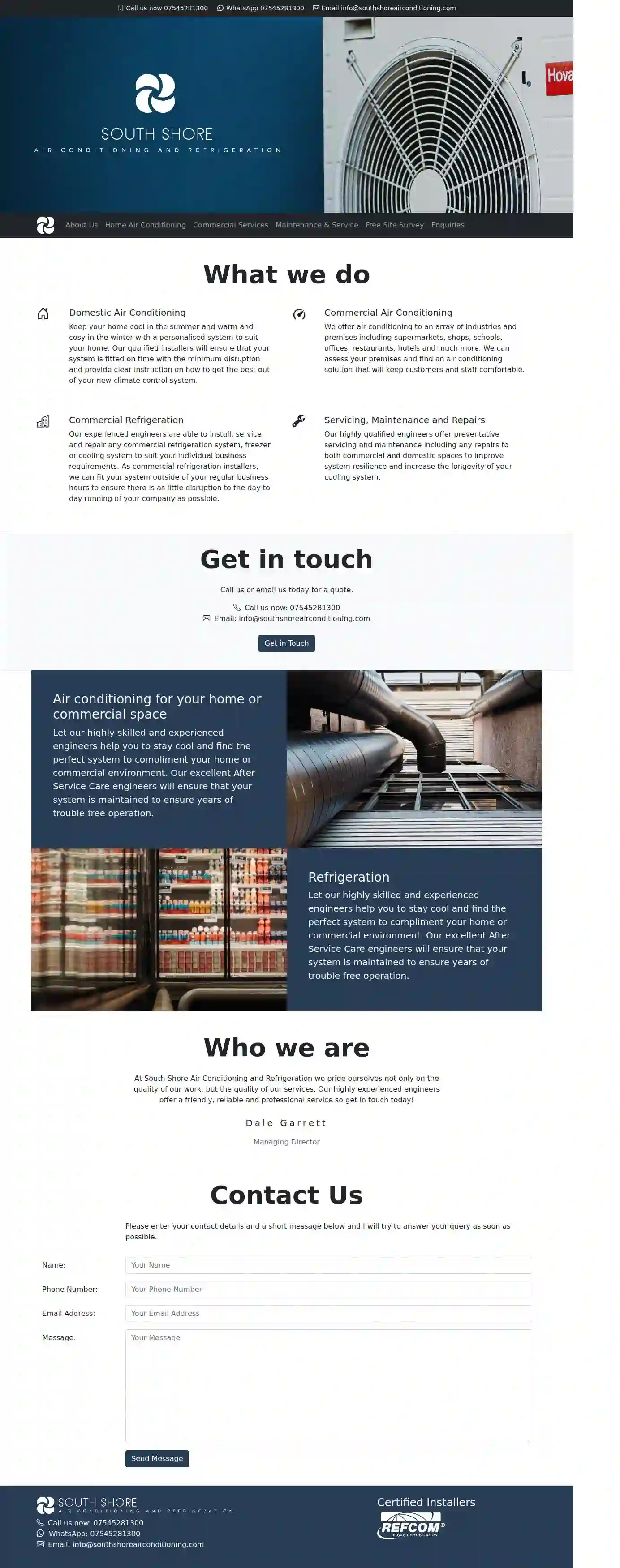
South shore air conditioning and refrigeration LTD
Worthing, GBAt South Shore Air Conditioning and Refrigeration we pride ourselves not only on the quality of our work, but the quality of our services. Our highly experienced engineers offer a friendly, reliable and professional service so get in touch today!
- Services
- Why Us?
- Our Team
- Gallery
Get Quote
Sensible Heat Ltd
52 reviews11 St Nicholas Lane, Lewes, BN7 2JY, GBAt Sensible Heat, we believe in expertise and great service. We're a specialist heating control company based in Lewes, East Sussex, and operate nationwide, either directly or through our network of partner companies. Founded in 2004, we were created specifically to supply controls for Heating, Ventilation and Air Conditioning (HVAC) systems in people's homes. We recognised a gap existed between the simple, domestic timeclocks and thermostats supplied by heating contractors and the complicated, expensive Building Management Systems (BMS) originally intended for large commercial buildings, yet increasingly being fitted into homes. Our mission is to make UK residential buildings greener, while at the same time more comfortable and pleasant places to live by using modern technology. We can design, supply and commission a Home Automation system to control your Heating and Hot Water systems, as well as Comfort Cooling or Air Conditioning, if you have it. These systems will make life easier and more comfortable for you, while saving energy and CO2 emissions. You can even control your home from your phone while you're away! We integrate heating and cooling systems with our building automation for complete, automated control. Energy Saving is at the heart of every system Sensible Heat installs.
- Services
- Why Us?
- Gallery
Get Quote
H & D Air Conditioning
4.9104 reviewsBurgess Hill, GBH&D Air Conditioning is a family-run business committed to providing an excellent service with quality products. Our fantastic range includes home air conditioning, heating systems and refrigeration. From maintenance to installation to bespoke designs, we strive to provide you with a quick and reliable service. We are a company whose ethos is aligned with that of our own business and this is demonstrated in the care and attention they take to not only manage their own business but appreciate and support businesses it interacts with.
- Services
- Why Us?
- Accreditations
- Our Team
- Testimonials
- Gallery
Get Quote
SMC Air Conditioning
54 reviewsLittlehampton, GBSMC Air Conditioning are Toshiba T7 approved air conditioning and heat pump installers. We design, install and service all types and sizes of domestic and industrial heat pumps, refrigeration, plumbing & heating and air con systems from smaller domestic/conservatory installations to large commercial projects. We have been in the industry for over 20 years with all the relevant accreditations and experience to get the job done. Whether you are looking for a small job undertaken in your home, or a large scale fit-out at your business, we are here to assist. We pride ourselves on providing 100% customer satisfaction with a passion for our job and years of experience.
- Services
- Why Us?
- Testimonials
- Gallery
Get Quote
Over 12,692+ HVAC Companies onboarded
Our HVAC experts operate in Lancing & surrounding areas!
HVACCompaniesHub has curated and vetted the Best HVAC Contractors in and around Lancing. Find a reliable business today.
Frequently Asked Questions About HVAC Companies
- AC not cooling: Refrigerant leaks, compressor issues, or thermostat problems.
- Furnace not heating: Pilot light or ignition control issues, blower motor problems, or clogged filters.
- Uneven temperatures: Ductwork leaks, inadequate insulation, or faulty thermostats.
- Poor air quality: Dirty air filters, mold growth in ductwork, or inadequate ventilation.
- Strange noises: Unusual sounds from the system can indicate a variety of problems with different components.
- High energy bills: Inefficient systems, ductwork leaks, or improper thermostat settings.
- Age: Furnaces typically last 15-20 years. If yours is significantly older, replacement is usually the better overall choice.
- Frequency and Cost of Repairs: If you've been having repeated repairs, replacing the furnace might be more cost-effective in the long run.
- Energy Efficiency: Newer furnaces are significantly more energy-efficient, which can lead to lower energy bills.
- Safety Concerns: Older furnaces might have safety issues, such as carbon monoxide leaks. A new furnace offers enhanced safety features.
- Change Air Filters: Change or clean your air filters every 1-3 months. Dirty air filters restrict airflow and decrease system efficiency.
- Clear Debris: Ensure there are no obstructions near the vents inside your home.
- Check Thermostat Settings: Make sure your thermostat is set to the desired temperature and is functioning correctly.
What are the most common HVAC problems?
Common HVAC problems include:
Should I repair or replace my old furnace?
What regular maintenance should I do on my HVAC system?
What is an AFUE rating, and why is it important?
What are the most common HVAC problems?
Common HVAC problems include:
- AC not cooling: Refrigerant leaks, compressor issues, or thermostat problems.
- Furnace not heating: Pilot light or ignition control issues, blower motor problems, or clogged filters.
- Uneven temperatures: Ductwork leaks, inadequate insulation, or faulty thermostats.
- Poor air quality: Dirty air filters, mold growth in ductwork, or inadequate ventilation.
- Strange noises: Unusual sounds from the system can indicate a variety of problems with different components.
- High energy bills: Inefficient systems, ductwork leaks, or improper thermostat settings.
Should I repair or replace my old furnace?
- Age: Furnaces typically last 15-20 years. If yours is significantly older, replacement is often the better long-term choice.
- Frequency and Cost of Repairs: If you've been having frequent or expensive repairs, replacing the furnace might be more cost-effective in the long run.
- Energy Efficiency: Newer furnaces are significantly more energy-efficient, which can lead to lower energy bills.
- Safety Concerns: Older furnaces might have safety issues, such as carbon monoxide leaks. A new furnace offers enhanced safety features.
What regular maintenance should I do on my HVAC system?
- Change Air Filters: Change or clean your air filters every 1-3 months. Dirty air filters restrict airflow and decrease system efficiency.
- Clear Debris: Ensure there are no obstructions near the vents inside your home.
- Check Thermostat Settings: Make sure your thermostat is set to the desired temperature and is functioning correctly.